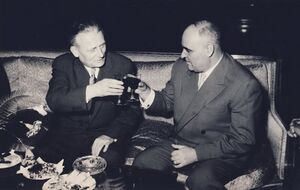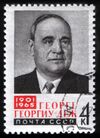گيورگى گيورگيو-ديج
| گيورگى گيورگيو-ديج Gheorghe Gheorghiu-Dej | |
|---|---|
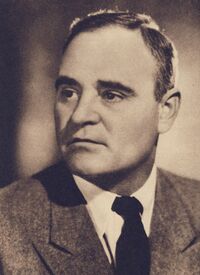
| |
| Gheorghe Gheorghiu-Dej's official portrait, taken on 8 February 1948, which then became common during his leadership | |
| الأمين العام للحزب الشيوعي الروماني[a] | |
| في المنصب أكتوبر 1944 – 19 أبريل 1954 | |
| سبقه | Ștefan Foriș |
| خلفه | Gheorghe Apostol |
| في المنصب 30 سبتمبر 1955 – 19 March 1965 | |
| سبقه | Gheorghe Apostol |
| خلفه | نيقولاي تشاوشسكو |
| رئيس مجلس الدولة | |
| في المنصب 21 مارس 1961 – 19 مارس 1965 | |
| سبقه | Ion Gheorghe Maurer (as President of the Presidium of Great National Assembly) |
| خلفه | Chivu Stoica |
| President of the Council of Ministers | |
| في المنصب 2 يونيو 1952 – 2 أكتوبر 1955 | |
| سبقه | Petru Groza |
| خلفه | Chivu Stoica |
| First Vice President of the Council of Ministers | |
| في المنصب 15 April 1948 – 2 June 1952 | |
| رئيس الوزراء | Petru Groza |
| سبقه | Gheorghe Tătărescu |
| Minister of Industry and Commerce | |
| في المنصب 1 December 1946 – 14 April 1948 | |
| رئيس الوزراء | Petru Groza |
| سبقه | Petre Bejan |
| Minister of Public Works | |
| في المنصب 6 March 1945 – 30 November 1946 | |
| رئيس الوزراء | Petru Groza |
| سبقه | Virgil Solomon |
| خلفه | Ion Gh. Vântu |
| Minister of Communications | |
| في المنصب 4 November 1944 – 30 November 1946 | |
| رئيس الوزراء | Constantin Sănătescu Nicolae Rădescu Petru Groza |
| خلفه | Nicolae Profiri |
| تفاصيل شخصية | |
| وُلِد | 8 نوفمبر 1901 بارلاد، Vaslui County, مملكة رومانيا |
| توفي | 19 مارس 1965 (aged 63) بوخارست، جمهورية رومانيا الشعبية |
| المدفن | Carol Park, بوخارست، رومانيا (until 1991) Bellu Cemetery, بوخارست، رومانيا (بعد 1991) |
| القومية | روماني |
| الحزب | الحزب الشيوعي الروماني (1930–1965) |
| الزوج | Maria Alexe |
| a. ^ First Secretary of the Romanian Worker's Party (from February 1948) | |
گيورگى گيورگيو-ديج ( Gheorghe Gheorghiu-Dej ؛ النطق بالرومانية: [ˈɡe̯orɡe ɡe̯orˈɡi.u ˈdeʒ] (![]() استمع)؛ 8 نوفمبر 1901 – 19 مارس 1965) كان سياسياً شيوعياً رومانياً وكهربائي. وكان أول زعيماً شيوعياً لرومانيا من 1947 حتى 1965, serving as first secretary of the Romanian Communist Party (ultimately "Romanian Workers' Party", PMR) from 1944 to 1954 and from 1955 to 1965, and as the first Communist Prime Minister of Romania from 1952 to 1955.
استمع)؛ 8 نوفمبر 1901 – 19 مارس 1965) كان سياسياً شيوعياً رومانياً وكهربائي. وكان أول زعيماً شيوعياً لرومانيا من 1947 حتى 1965, serving as first secretary of the Romanian Communist Party (ultimately "Romanian Workers' Party", PMR) from 1944 to 1954 and from 1955 to 1965, and as the first Communist Prime Minister of Romania from 1952 to 1955.
Born in Bârlad (1901), Gheorghiu-Dej was involved in the communist movement's activities from the early 1930s. Upon the outbreak of World War II in Europe, he was imprisoned by Ion Antonescu's regime in the Târgu Jiu detention camp, and escaped only in August 1944. After the forces of King Michael ousted Antonescu and had him arrested for war crimes, Gheorghiu-Dej together with prime-minister Petru Groza pressured the King into abdicating in December 1947, marking the onset of out-and-out Communist rule in Romania.
Under his rule, Romania was considered one of the Soviet Union's most loyal satellite states, though Gheorghiu-Dej was partially unnerved by the rapid de-Stalinization policy initiated by Nikita Khrushchev at the end of the 1950s. Gheorghiu-Dej stepped up measures that greatly increased trade relations between Romania and the Western countries. However, at the same time his government was accused of human rights violations within the country.
He died of lung cancer in March 1965. His once protégé Nicolae Ceaușescu succeeded him as General Secretary.
. . . . . . . . . . . . . . . . . . . . . . . . . . . . . . . . . . . . . . . . . . . . . . . . . . . . . . . . . . . . . . . . . . . . . . . . . . . . . . . . . . . . . . . . . . . . . . . . . . . . . . . . . . . . . . . . . . . . . . . . . . . . . . . . . . . . . . . . . . . . . . . . . . . . . . . . . . . . . . . . . . . . . . . .
النشأة
Gheorghiu-Dej was the son of a poor worker from Bârlad,[1] Tănase Gheorghiu, and his wife Ana. He also had a younger sister named Tinca.
في السلطة
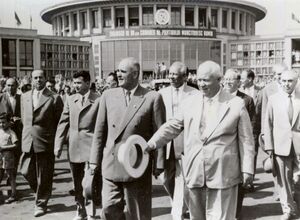 گيورگيو-ديج مع نيكيتا خروشوڤ في مطار بانياسا ببوخارست في يونيو 1960. نيقولاي تشاوشسكو يمكن رؤيته ناحية اليد اليمنى لگيورگيو-ديج. |
التعامل مع الغرب
In the early years of Gheorghiu-Dej's rule Romania's relations with the West were tense, marked by accusations of United States espionage and Romanian human rights violations. There were also low levels of trade between Romania and the West, as Romania tied itself to the Soviet Union and the other satellite nations; in 1950, Romania's economic plan involved 89% of trade to be solely with the Soviet Bloc.
الوفاة والذكرى
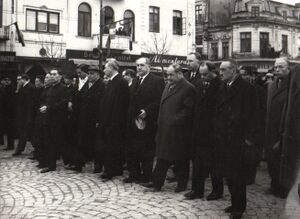
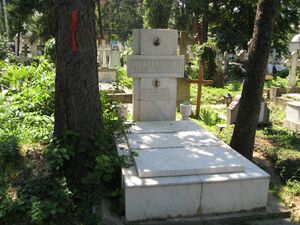
الهامش
- ^ Neagoe-Pleșa, p. 77
المراجع
- Neagoe-Pleșa, Elis (2014). "Gheorghe Gheorghiu-Dej și „procesul ceferiștilor" (1933–1934)". In Cioroianu, Adrian (ed.). Comuniștii înainte de comunism: procese și condamnări ale ilegaliștilor din România [Communists before communism: trials and convictions of the illegalists in Romania] (PDF) (in الرومانية). Bucharest: Editura Universității București. ISBN 978-606-16-0520-0.
المصادر الرئيسية
- Chicago Tribune, July 4, 1964; p. 11; Tito Socialism Wins Support in Balkans; Donald Starr.
- The Times, Saturday, August 29, 1953; p. 7; Issue 52713; col F. "Communism In Rumania Arrests And Collectives In A Satellite State From Our Special Correspondent".
- The Times, Saturday, May 11, 1963; p. 7; Issue 55698; col C. "Comecon Meets In Warsaw Preparing For Party Secretaries' Talks".
- The Times, Tuesday, Nov 26, 1963; p. 9; Issue 55868; col D. "Rumania Leader At Yugoslavia Steel Centre Power Project On Danube".
- The Times, Monday, Apr 13, 1964; p. 10; Issue 55984; col A. "Mr. Khrushchev's Allies To Meet This Week Rumania Still Stands Aloof From China Dispute From Our Special Correspondent".
- The Times, Monday, Jun 08, 1964; p. 10; Issue 56032; col F. "Signs Of Coming Russian Clash With Rumania Background To President Tito's Leningrad Visit Today From Our Own Correspondent".
- The Times, Friday, Dec 11, 1964; p. 13; Issue 56192; col F. "Rumanian Drive For Independence".
- The Times, Friday, Jan 22, 1965; p. 9; Issue 56226; col A. "Warsaw Pact Warning On M.L.F. Counter-Measures Threatened".
- The Times, Thursday, Mar 25, 1965; p. 10; Issue 56279; col E. "Rumania Affirms Independence".
المصادر الثانوية
- Dennis Deletant, Communist Terror in Romania: Gheorghiu-Dej and the Police State, 1948–1965 (New York: St. Martin's Press, 1999).
- Dennis Deletant, Romania under Communist Rule (Portland, OR: Center for Romanian Studies, 1998).
- Dennis Deletant, "The Securitate and the Police State in Romania: 1948–64," Intelligence and National Security 8, no. 4 (1993): 1–25.
- Stephen Fisher-Galați, Twentieth Century Rumania (New York: Columbia University Press, 1970).
- Johanna Granville,"Dej-a-Vu: Early Roots of Romania's Independence,"East European Quarterly, vol. XLII, no. 4 (Winter 2008), pp. 365–404.
- Bruce J. Courtney and Joseph F. Harrington, Tweaking the Nose of the Russians: Fifty Years of American-Romanian Relations, 1940–1990 (East European Monographs, 1991).
- Tom Gallagher, Theft of a Nation: Romania Since Communism (Hurst & Company, 2005).
- Mary Ellen Fischer, Nicolae Ceaușescu and the Romanian Political Leadership: Nationalization and Personalization of Power (Skidmore College, 1983).
- Paul D. Quinlan, The United States and Romania: American–Romanian Relations in the Twentieth Century (ARA Publications, 1988).
- Vladimir Tismăneanu, Fantoma lui Gheorghiu-Dej, Editura Univers, 1995.
- Vladimir Tismăneanu, Stalinism for All Seasons: A Political History of Romanian Communism (Berkeley: University of California Press, 2003).
| مناصب حزبية | ||
|---|---|---|
| سبقه Ștefan Foriș |
General Secretary of the Romanian Communist Party 1944–1954 |
تبعه Gheorghe Apostol |
| سبقه Gheorghe Apostol |
General Secretary of the Romanian Workers' Party 1955–1965 |
تبعه نيقولاي تشاوشسكو |
- Short description is different from Wikidata
- CS1 الرومانية-language sources (ro)
- مواليد 1901
- وفيات 1965
- People from Bârlad
- حكام شيوعيون
- Heads of state of Romania
- People of the Cold War
- Prime Ministers of Romania
- Deputy Prime Ministers of Romania
- Romanian Ministers of Communications
- Romanian Ministers of Economy
- Romanian Ministers of Public Works
- Members of the Chamber of Deputies (Romania)
- General Secretaries of the Romanian Communist Party
- State Council of Romania
- Inmates of Doftana prison
- Inmates of Târgu Jiu camp
- Romanian delegation to the Paris Peace Conference of 1946
- Romanian communists
- Communism in Romania
- Romanian atheists
- Politicide perpetrators
- Burials at Bellu Cemetery
- Deaths from cancer in Romania
- Deaths from lung cancer

